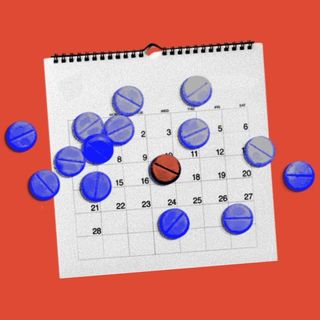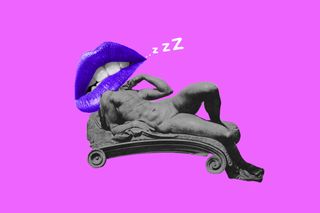
Why Orgasming Before Bed Can Help People Fall Asleep Faster, Deeper
The neurochemical changes our bodies undergo during an orgasm reduce stress and anxiety, and induce feelings of relaxation and contentment,

Sex might be a taboo topic, but going by the swiftly escalating rates of urban sleepnessness worldwide, sleep is assuming the form of a rare indulgence. Turns out “the relationship between sex and sleep is bidirectional,” as clinical psychologist Michael Breus wrote. Indeed, getting it on before sleep — and orgasming, particularly — can make one snooze faster and deeper, science says.
“I have a demanding schedule… I fall asleep easily because I’m already so tired by the time my head hits the pillow, but my sleep isn’t always restful, and when I wake up in the mornings, I don’t feel refreshed,” says Rita, a woman living in Singapore, adding: “However, when I make love and have had an orgasm, I find that I do sleep better — for instance, I don’t toss and turn during the night. And, when I wake up, I feel like I got a good night’s rest. It’s a bit like after I’ve done a yoga class — my body just feels so calm and relaxed.”
Could sex, then, help Indians rise from the ranks of being the second-most sleep-deprived people in the world? A study, published in the Journal of Sleep Research this January, concluded that “sexual activity and intimacy may improve sleep and overall well-being in both men and women.” The study focused primarily on the benefits of orgasms stemming from partnered sex, noting that intercourse without orgasms or masturbation didn’t have nearly the same effect on sleep.
Past research, however, has indicated that orgasms — regardless of whether it is achieved through masturbation or partnered sex — can improve the quality of sleep. In fact, one article even refers to “nightly masturbation as a stand-in antidepressant” and another calls orgasms “the best, easiest, and quickest sleep hack there is.”
Related on The Swaddle:
How Sleeping Next to Our Partners Can Improve Our Health and Wellbeing
“Orgasms make you feel good, and once achieved, your body is in a state of bliss and relaxation. Whether it is achieved solo, or with a partner, it promotes connectedness with your mind, body, spirit, and soul,” explains Dr. Angela Jones, an obstetrician and gynecologist from New Jersey. “When these things are in order… so will be your sleep.”
Yet, despite the internet hosting thousands of dialogues, rants, and pieces of expert advice on tackling the global rise in chronic sleeplessness and its socio-economic impact, the relationship between sex and sleep has been largely overlooked — and, therefore, misunderstood. This leads to the question: how exactly can an orgasm improve sleep?
“When you have an orgasm, you release a cocktail of hormones that helps you feel relaxed and sleep better. Think of this cocktail as the body’s natural sleep remedy,” says Rebecca Alvarez Story, a sexologist. “First, endorphins, the body’s natural pain-killing hormones, activate the body’s opiate receptors which make you feel happier and more relaxed. Then hormones like vasopressin and oxytocin counteract stress hormones and help you fall asleep faster. Norepinephrine and serotonin help your body get into a flow of REM sleep cycles to help you stay asleep.”
That is, the neurochemical changes our bodies undergo during an orgasm are responsible for improved sleep quality — by reducing stress and anxiety, and inducing feelings of relaxation and contentment, that come together to facilitate a seamless transition to sleep.
However, given that we live an age where hustle culture is glorified, and people are conditioned into believing they must work round-the-clock to taste sucess, one might be too exhausted to indulge in sexual activities when it’s time to finally retire for the day. While that’s perfectly natural, Martha Tara Lee, a clinical sexologist, believes it’s important to make an effort anyway.
Related on The Swaddle:
Why Mindfulness During Sex Is Linked to Greater Satisfaction, More Orgasms
“A good, healthy sex life doesn’t just happen; you need to be proactive in making it happen, and that means creating the time and having the energy for it,” she says, noting that “there seems to be this assumption that, to enjoy good sex or for sex to happen, one must be in the mood, that the sex should be spontaneous, or that our body clock must synchronise with our partner’s. That’s just not true. You might be a day person and your partner a night person, you might have a higher or lower sex drive compared to your partner, or you might have a different attitude towards spontaneity in sex.”
Unfortunately, however, the existence of the “orgasm gap” — the disparity in orgasms between cis-gendered men and women in heterosexual relationships — suggests that partnered sex might not be the most foolproof way for women in heterosexual relationships to pursue quality sleep. Poor sex education only serves to erect further barriers for women, in this regard: with some never been granted access to the vocabulary to communicate their sexual needs, while some others remain oblivious to the fact that women can, at all, orgasm. In addition, a number of women deal with anorgasmia — “delayed, infrequent, absent, significantly less-intense orgasms, after sexual arousal and adequate sexual stimulation” — too.
Thankfully, that doesn’t necessarily curse one to a lifetime of below-par sleep. “Though orgasm is the peak of sexual excitement, it is not the only ultimate goal of sex. If you or your partner are not able to reach the climax, it is okay. Sex has so many pleasurable levels,” states Dr. Niveditha Manokaran, a venereologist. According to her, what’s helpful, in this regard, is this: “[O]pen communication, paying attention, consent and respecting boundaries, not just in bed… but at all times.”
Given the growing body of research around the numerous benefits to having a healthy sexual life, it’s increasingly more important to reflect upon Lee’s advice.
Devrupa Rakshit is an Associate Editor at The Swaddle. She is a lawyer by education, a poet by accident, a painter by shaukh, and autistic by birth. You can find her on Instagram @devruparakshit.
Related


Why the Pursuit of the Korean ‘Glass Skin’ Might, Scientifically, Be a Redundant Venture for Indians
